LONDON – In our job, we have the pleasure of sitting down with some of the most talented and creative filmmakers and performers on the planet. But no matter how enlightening that may be, little compares to meeting the subject of a documentary. Somebody who has achieved something so remarkable, someone else went and made a film about them. Naturally, it was a joy to meet Tracy Edwards, the subject of Maiden, directed by Alex Holmes and now nominated at BAFTA, and named after the boat she skippered at the Whitbread Round the World Yacht Race – the first ever all-female crew to do so. She talks to us about her experiences from the time and what it means to see her story documented on screen. She also talks about the changing of the word ‘feminist’, and on whether she has a WhatsApp group for the old gang…
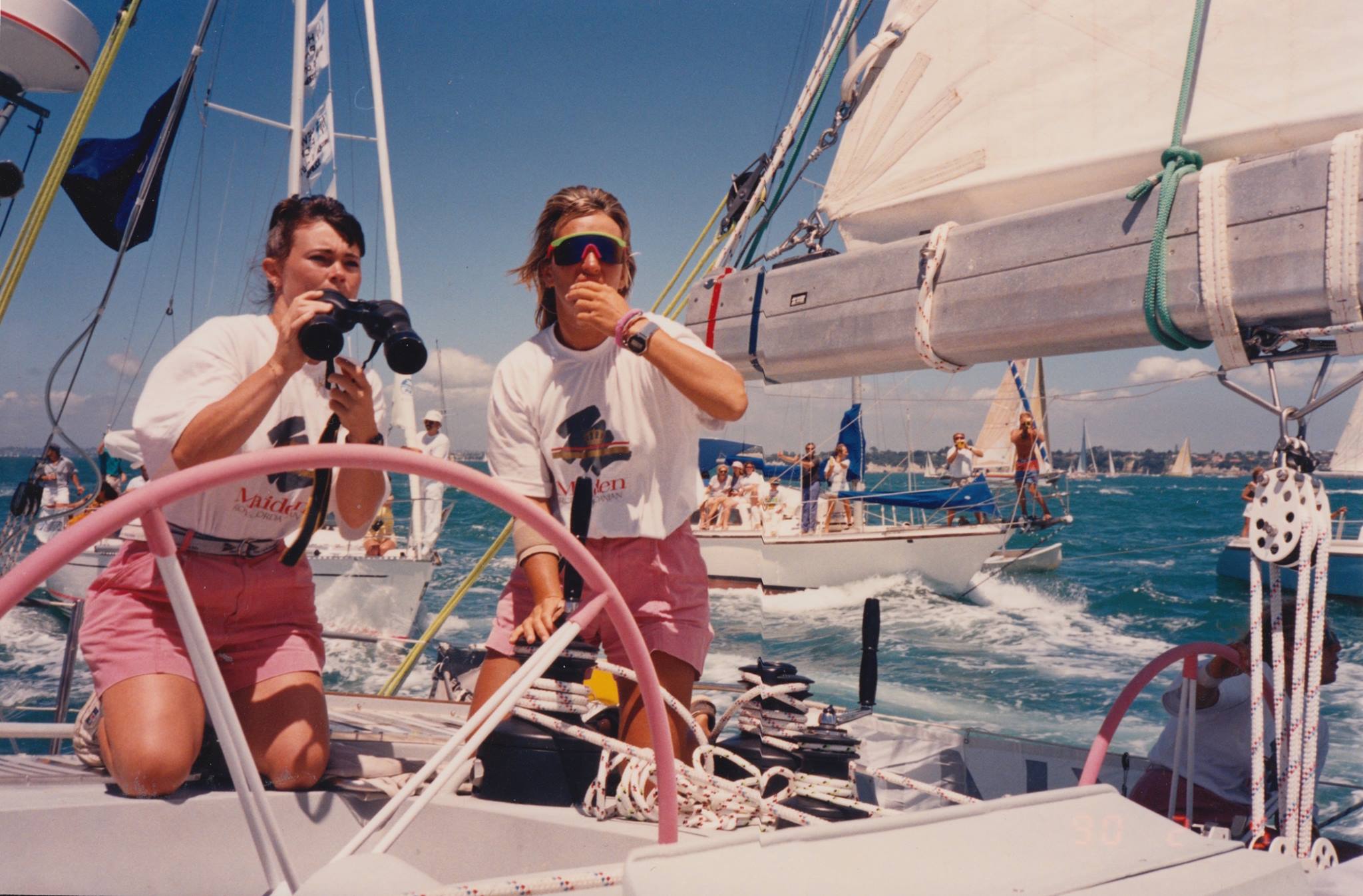
In the opening moments in the film the narrator says that you’ve got to be ‘mad’ to have sailed around the world. Is that true? And what was it that drove you? We all have these lofty ambitions, but most of us don’t see them through – but you did the unthinkable.
Well you see for me it wasn’t unthinkable. Because it was part of my life. Sailing was my life, so it’s like saying to someone, ‘you work in an office, why did you go for a promotion?’. It’s the next step. I mean obviously it was a big step, but sailing around the world in the 85/86 Whitbread was something a friend of mine told me I would enjoy as I just started getting into racing, and I realised I was happiest when out on the ocean. It was even a battle getting on as a cook, but I did. I had no idea, and still wasn’t sure if it was for me, but when racing neck and neck down the coast of New Zealand, I thought, this is so cool.
Being accepted by the crew made my life a bit easier, and then getting to the end and thinking, okay, this is the most fun you can have with your clothes on, basically. But not wanting to go around with guys again because as much as I ended up getting on really well from them and learning loads from them as they were all really happy to teach me, I did still feel strongly about putting an all-female crew together as a natural next step, because why weren’t women sailing around the world? There are 230 people and only four girls? Seriously? It was like a really well kept secret and I was going to blow the whole thing wide open. I knew that the only way we could get more women into the Whitbread and the only way we could race as sailors was to be by putting an all-female crew together, so it was for me just the next step.
In the film you speak about how your mum tried to put you off, and of course you had to deal with a lot of men who tried to stop you, but did that make you even more defiant?
Absolutely. My mum said to me, I wonder what would’ve happened if everyone had just turned around and said, ‘oh yeah that’s a good idea, off you go’. I probably would’ve gone and done something else! So bless them for doing it, thank you very much, it made us battle through.
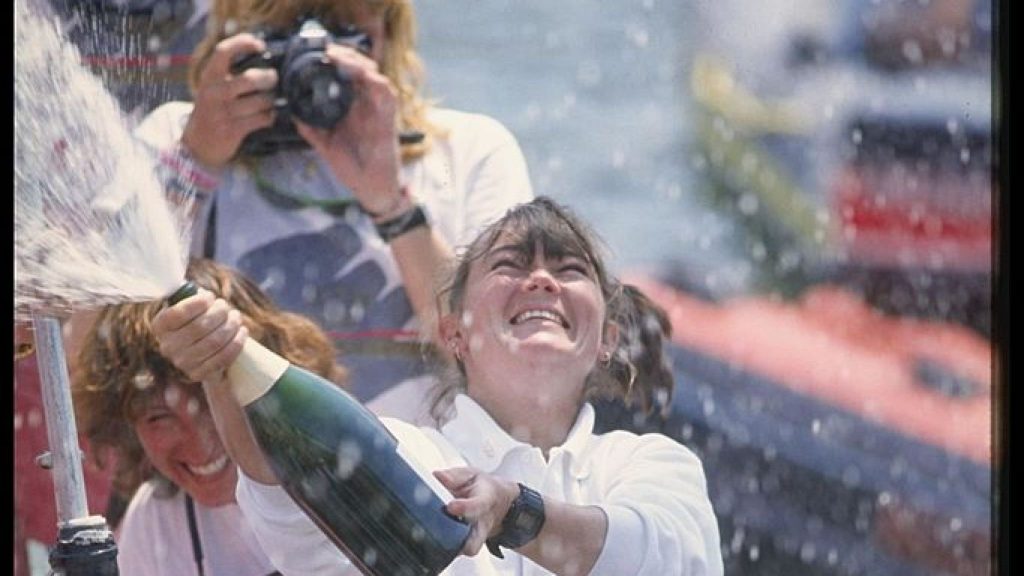
Had you had offers before to have a documentary made about you, and what was it about this particular pitch that made you think, this is the story I’d like to tell, and this is the director I’d like to tell it?
Well there had been a documentary right at the end, but it’s quite dated now and it was also very happy and jolly and everything was fine, and of course it wasn’t fine. So about four years ago just when we started rescuing Maiden for her next chapter of her life, I went and did a talk at a school and a guy called me up the next morning and he said, ‘Hi my name is Alex Holmes and I’m a director, has anyone ever made a documentary about you?’. I said not really, and he said he wanted to speak to me about making one. I was a little bit unsure at first, I wanted to see what he had to say. But I sat down and chatted with him and he was just so enthusiastic about it and he got it in the way he talking about it, and his daughter had heard the talk I gave at the school, and I instinctively trusted him, and that for me was the most important thing, because I am committing what we did to someone, and we had to trust him.
He said he wanted to do a drama because there wouldn’t be any footage, and I told him there was loads of footage, and he said, ‘what?!’ I said we filmed all of it, so they then spent the next two years looking for the footage but it was everywhere. While that was happening I was rescuing Maiden. After everything they’d found and when they had put it all together, I was speaking to the crew and said, do you mind speaking to this guy Alex, he’s doing this documentary, he’s doing interviews. And every one of the girls said, ‘how honest are we being about what happened?’ and I said, ‘honest as you like – let’s do it, let’s go for it’.
I was taken aback by just how much footage there was. Did you ever feel at the time, with the camera always rolling, that it could one day be turned into a film? Did it ever feel significant enough at the time it all happened that it would even one day be worthy of being a film?
Not really. We felt it was important to document it, and we knew there would be a documentary about the race at the end and we wanted footage for that, but no, we had no idea that 30 years later that someone would come along and say, ‘this is such a great story’, because we were just doing it.
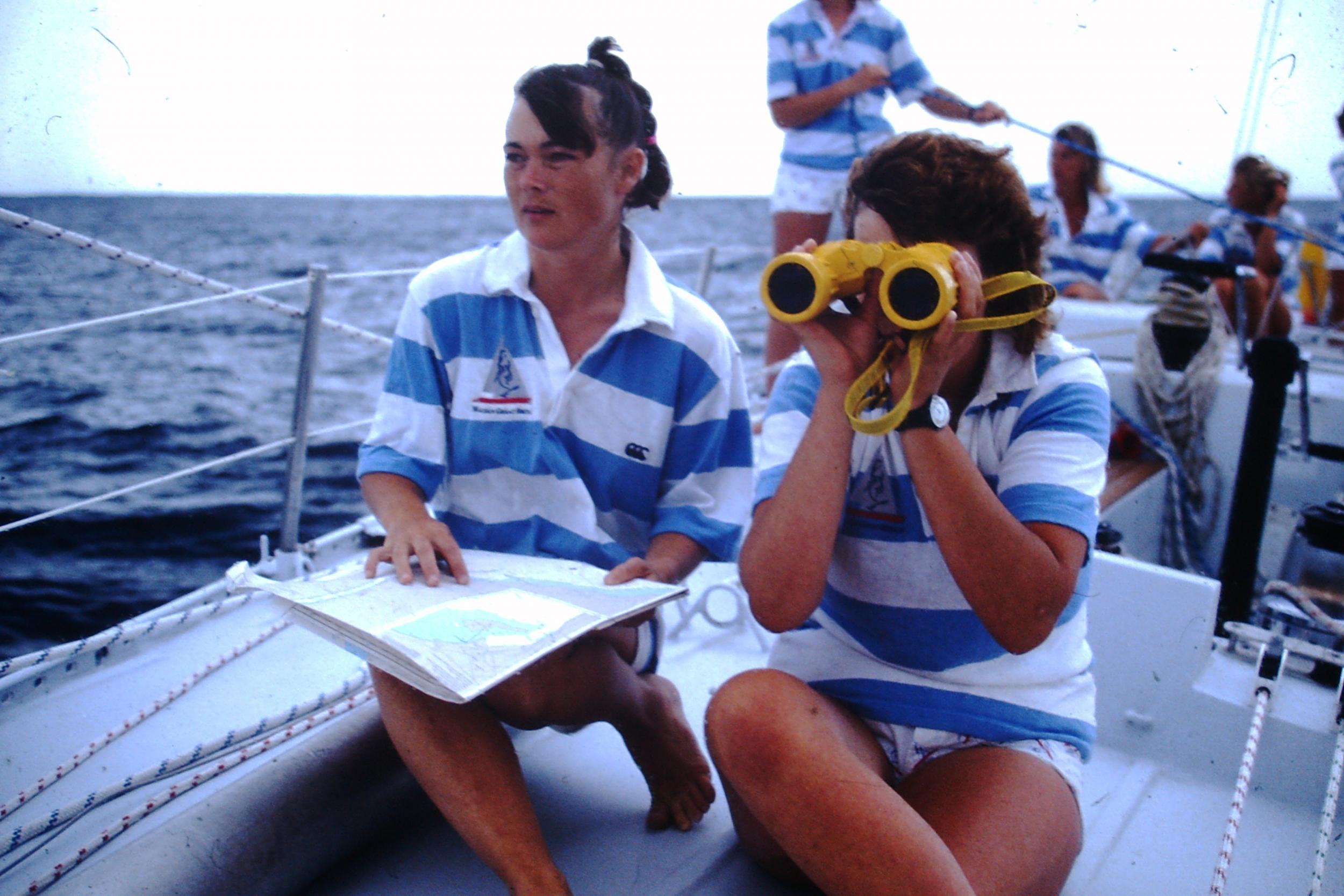
It feels incredibly relevant now as well, which is a sad indictment of society. Because you would think that in the last 30 years we would’ve progressed to a point where it feels like we do have more equality. It must be quite troubling for you to watch this now and realise we haven’t come as far as perhaps we may have expected to? Because the film has a real element of hope attached to it, it feels like that was the start of something, and yet we’re here three decades later and we’re having the same conversations.
It is sad. I mean obviously there have been massive changes, but not enough, and not enough by a long way. I remember when I was younger watching documentaries about women’s lib, and about the battle for equal pay and I remember when that became law, and we’re still having that conversation aren’t we because of the gender difference in pay. Which is illegal. But what is interesting is that 30 years ago it was almost easier to have the fight against sexism because it was right there, someone was saying ‘you can’t do it’ and you would say, ‘yes I can’. You could deal with that battle. But what sadly has happened today is that on the surface things are changing, but I speak to so many young women who have a horrendous time in the work place. And this is a very small minority of men, most men I speak to are well into the 21st century and intelligent men know that equality is the only way forward as it’s the only way the planet will survive, and smart people know that, but there are some you can’t drag into the 21st century. It’s that insidious underlying casual sexism within the workplace which I find so distressing, that young women still have to put up with that.
You just think, what has to change here? Some sports are really leading the way, like rugby. They’ve done an extraordinary job with women’s rugby. But football… And this is an example, but when we got to the semi finals of the World Cup, and someone online said, ‘this is the first time we’ve got to the semi finals for twenty odd years’, and someone said, ‘ummm the women got there just the other year’. I don’t think this is deliberate in most cases, I think it’s just changing people’s habits and the way they think. But oh my God, why, why do people still think like that? But then I look at my daughter’s generations, and I think, you know, they are very much more equal than we were.
In the documentary there’s footage of you from 30 years ago where you said that you didn’t consider yourself a feminist, do you now? If so, what changed?
I wasn’t one because I didn’t know I needed to be. I was naïve I have to say to think I could just waltz into the male dominated sailing world and skipper and all-female crew, like everyone would say, ‘oh that’s good’. You see, feminism had been made into a horrible, nasty, dirty word when I was that age, because it had been hijacked and what’s happened in the last few years, by my daughter’s generation, of those under 30, is they’ve taken it back. At the time to say you were a feminist was like the kiss of death, and it wasn’t until later on in the race when I thought, if I believe in equality and that makes me a feminist, then I am one. So yes, I am. Now you have men wearing t-shirts saying ‘this is what a feminist looks like’. We’ve reclaimed that word back and it’s a positive thing.
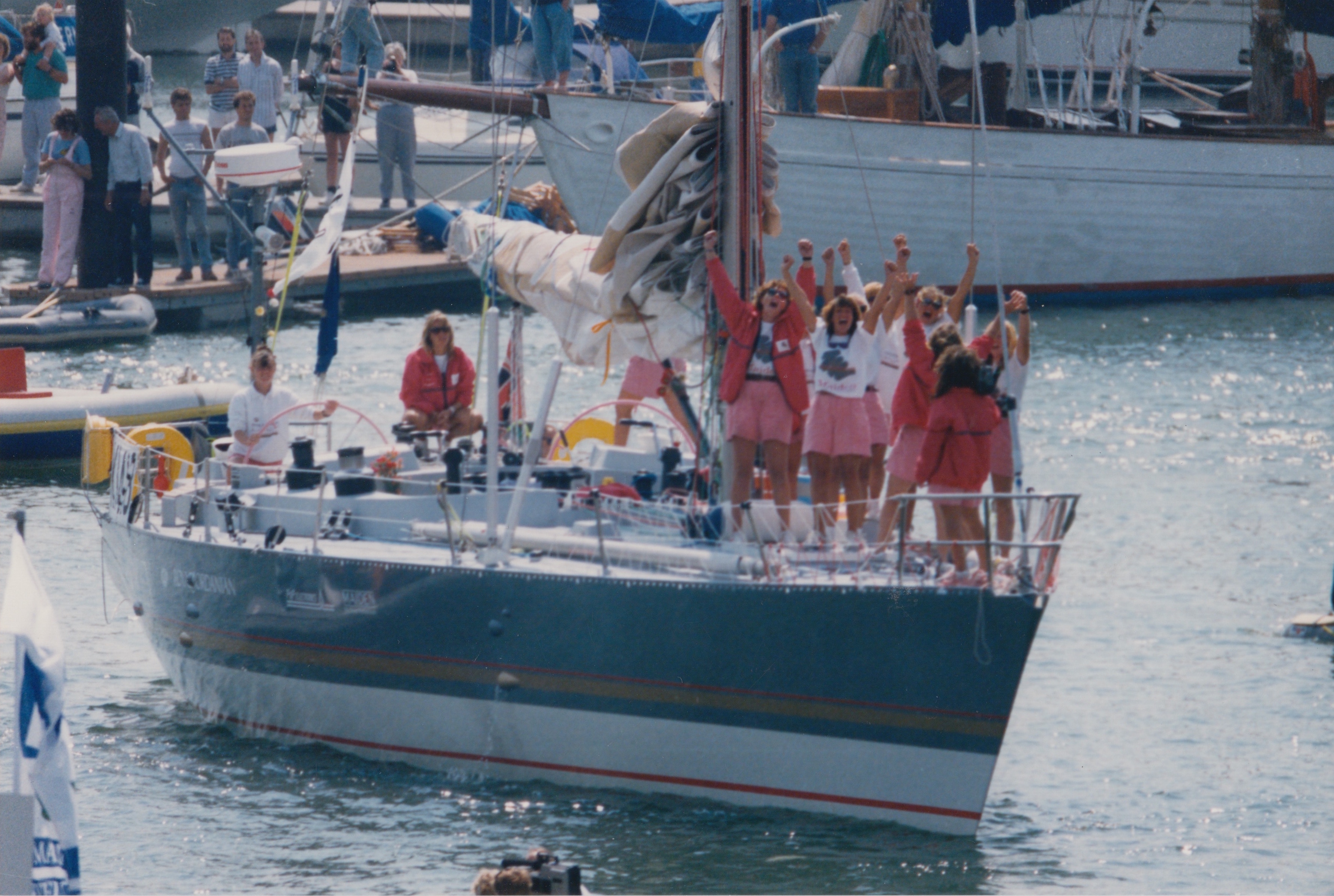
It was very hard not to be moved and emotional in the latter stages of the film, is that the case for yourself? When revisit those memories, do they overwhelm you?
Oh my God, yes.
Do you think about those moments often?
I think about those moments when I’m feeling low or down, and I do remember that day, and I can remember every second of that day, and the way I felt. I can remember so clearly. And I’ll look through photographs and see all the happy smiling faces and everything else, so yeah, I do remember it.
Most of us have these amazing memories from our youth that we can’t revisit. You have your life on screen, your greatest achievements on screen. Is it surreal watching them back?
Very surreal. All of us, all of the original crew watches and thinks, that’s not me. It felt as though we were watching other people, and that’s very weird. And with everything we’ve got going on with Maiden now, that’s been quite strange, because it’s all very parallel. What we’re doing with Maiden now is having the same struggles; girl’s education, girls not being allowed to get on boats, so we’re taking them on Maiden, and here we are with the film. It’s also quite funny watching yourself say stuff and thinking… that doesn’t sound like me at all? Did I say that?
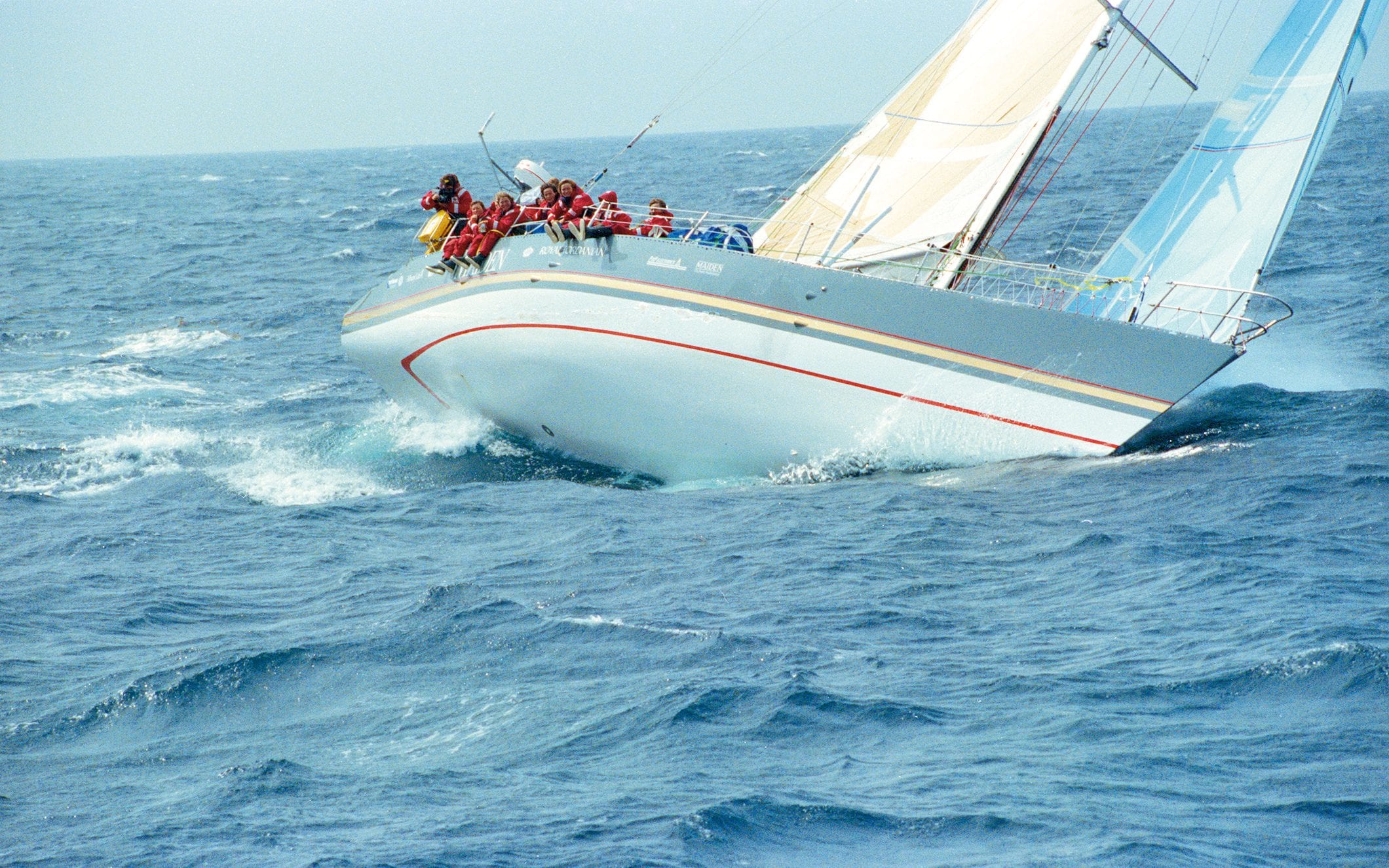
Do you still all meet up?
Yep. Of course Facebook has been fantastic for anyone who has lived our kinds of life, with friends all over the place, but we had never had all of us back together until the viewing of the documentary. We’ve had little reunions but the film has really brought us all back together.
You need a Maiden WhatsApp group.
Oh, we have a Maiden WhatsApp group [laughs].
Did you feel a pressure at the time as though you were representing women? Did it feel like you had to do this to prove women could do it?
I don’t think we felt it until it got really tense. For me, the moment of realisation for me was when I thought we weren’t going to get the money. We had the boat, we had done what we’d done, but I didn’t think we were going to get the money. Then I realised this would be used as a stick to be beaten over the head of every woman who came after us. That if we didn’t do this, we were then putting the next all-female crew at a disadvantage, so that was the moment I realised that we had to do this, we now didn’t have a choice, this was for who came after us. We need to build this platform so the next people can come in and put the next layer on. That’s when I grew up quite a lot and it became serious.
You’ve achieved an incredible amount, and you must hear from so many people across your life say how proud they are of you. But do you ever stop and think about what you’ve done and feel pride? Because that’s easier said that done.
I know – especially for the British! I think the documentary has gone a long way in helping that. But, it’s hard being British and a woman. But the film has actually taught me to say ‘thank you very much’ and feel proud of what we achieved. I’m writing my third book at the moment which was supposed to coincide with the documentary but I got completely distracted with Maiden, again, but writing that and having my daughter’s input, that’s been really good for me in getting rid of my imposter syndrome. I’ll say, ‘oh I haven’t done anything really’ and she’ll say to me, ‘why do you do that?’ she actually told me that if someone says to me that what I’ve done is amazing, to turn around and say ‘oh it’s nothing’ is actually quite insulting to the person saying it, they want you to say thank you very much and that you appreciate them saying it. So this has been a big lesson I’ve learnt and the documentary has been the final part of that lesson. So yeah, I do feel proud of what we’ve achieved.
- Watch it on CHILI now: Maiden

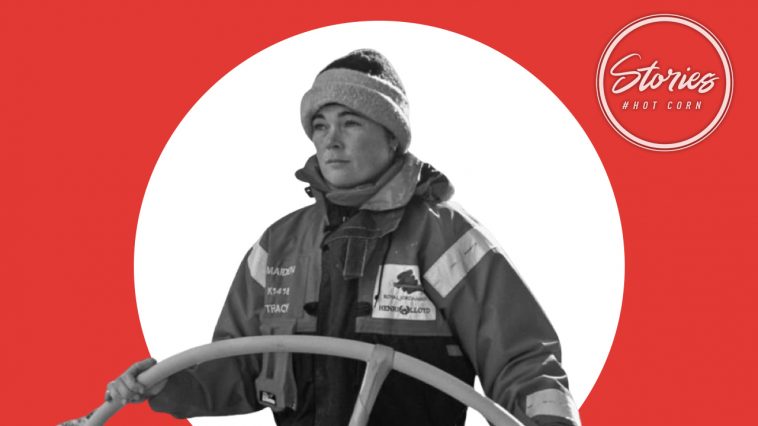
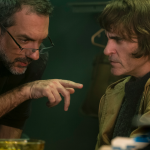



















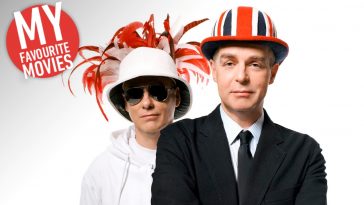


Leave a Comment